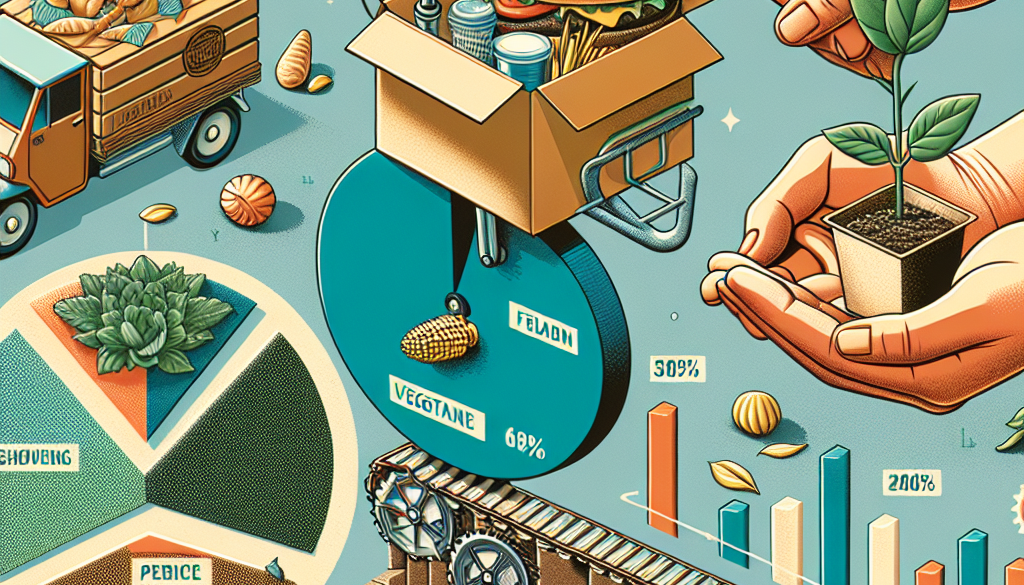Major Trends Impacting the Food Service Sector
-
Table of Contents
- Food Service Sector Trends: Driving Industry Evolution
- 1. The Rise of Plant-Based Options
- 2. Technology Integration and Automation
- 3. Health and Wellness Focus
- 4. Sustainability and Ethical Practices
- 5. The Growth of Delivery and Takeout Services
- 6. Experiential Dining
- 7. The Importance of Social Media and Online Presence
- Conclusion
- ETprotein: Catering to the Protein Needs of the Food Service Sector
Food Service Sector Trends: Driving Industry Evolution

The food service sector is a dynamic and ever-evolving industry, shaped by a myriad of factors ranging from technological advancements to changing consumer preferences. As we delve into the current landscape, it’s clear that several major trends are significantly impacting the way food businesses operate and engage with their customers. In this article, we will explore these key trends, supported by statistics and insights, to understand how they are transforming the food service sector.
1. The Rise of Plant-Based Options
One of the most significant trends in the food service industry is the growing demand for plant-based foods. According to a report by MarketsandMarkets, the global plant-based meat market size is projected to grow from USD 4.3 billion in 2020 to USD 8.3 billion by 2025, at a CAGR of 14.0% during the forecast period. This surge is driven by increasing health consciousness, ethical concerns regarding animal welfare, and environmental sustainability. Restaurants and food service providers are expanding their menus to include a variety of plant-based dishes to cater to this growing demographic.
2. Technology Integration and Automation
Technology is revolutionizing the food service sector, with automation and digital integration becoming commonplace. From self-service kiosks to AI-powered ordering systems, technology is streamlining operations and enhancing customer experiences. For instance, the adoption of contactless payment methods has seen a significant rise, with a report by the National Restaurant Association indicating that 67% of consumers prefer to pay via contactless methods post-pandemic.
3. Health and Wellness Focus
Consumers are increasingly prioritizing health and wellness, which is reflected in their dining choices. The demand for nutritious, high-quality ingredients is on the rise, with a focus on transparency and clean labels. According to the International Food Information Council’s 2020 Food & Health Survey, 54% of all consumers care more about the healthfulness of their food and beverage choices in 2020 than they did in 2010.
4. Sustainability and Ethical Practices
Sustainability is no longer a niche concern but a mainstream demand among consumers. The food service industry is responding by adopting more sustainable practices, such as reducing food waste, sourcing locally, and minimizing plastic use. A study by Unilever revealed that one-third of consumers (33%) choose to buy from brands they believe are doing social or environmental good.
5. The Growth of Delivery and Takeout Services
The pandemic has accelerated the growth of delivery and takeout services, with many consumers opting for the convenience and safety of dining at home. According to Statista, revenue in the Online Food Delivery segment is projected to reach US$151,526m in 2021. This trend is expected to continue post-pandemic, as food service providers enhance their delivery infrastructure and digital capabilities.
6. Experiential Dining
Despite the rise of delivery services, there is still a strong desire for unique and memorable dining experiences. Consumers are seeking more than just a meal; they want an experience that engages their senses and provides social value. This has led to the emergence of themed restaurants, interactive dining, and immersive culinary events.
7. The Importance of Social Media and Online Presence
Social media has become a critical tool for the food service industry, not only for marketing purposes but also for engaging with customers and managing reputation. A strong online presence can significantly influence consumer choices, with platforms like Instagram and TikTok driving food trends and restaurant discovery.
Conclusion
The food service sector is undergoing rapid transformation, influenced by a range of trends from plant-based diets and technology integration to a focus on health, wellness, and sustainability. As the industry adapts to these changes, businesses that stay ahead of the curve by embracing innovation and responding to consumer demands will thrive. The key takeaways for food service providers are to prioritize flexibility, invest in technology, and maintain a strong online presence while ensuring their offerings align with the values and preferences of today’s consumers.
ETprotein: Catering to the Protein Needs of the Food Service Sector
In line with the trend towards health and wellness, ETprotein offers a range of high-quality organic bulk vegan proteins that cater to the evolving demands of the food service industry. Their products, including Organic rice protein, clear rice protein, pea protein, and more, are characterized by a neutral taste, non-GMO, and allergen-free attributes. With L-(+)-Ergothioneine purity over 98%, ETprotein’s offerings are ideal for businesses looking to enhance their menu with nutritious and sustainable protein options.
About ETprotein:
ETprotein, a reputable protein and L-(+)-Ergothioneine (EGT) Chinese factory manufacturer and supplier, is renowned for producing, stocking, exporting, and delivering the highest quality organic bulk vegan proteins and L-(+)-Ergothioneine. They include Organic rice protein, clear rice protein, pea protein, clear pea protein, watermelon seed protein, pumpkin seed protein, sunflower seed protein, mung bean protein, peanut protein, and L-(+)-Ergothioneine EGT Pharmaceutical grade, L-(+)-Ergothioneine EGT food grade, L-(+)-Ergothioneine EGT cosmetic grade, L-(+)-Ergothioneine EGT reference grade and L-(+)-Ergothioneine EGT standard. Their offerings, characterized by a neutral taste, non-GMO, allergen-free attributes, with L-(+)-Ergothioneine purity over 98%, 99%, cater to a diverse range of industries. They serve nutraceutical, pharmaceutical, cosmeceutical, veterinary, as well as food and beverage finished product distributors, traders, and manufacturers across Europe, USA, Canada, Australia, Thailand, Japan, Korea, Brazil, and Chile, among others.
ETprotein specialization includes exporting and delivering tailor-made protein powder and finished nutritional supplements. Their extensive product range covers sectors like Food and Beverage, Sports Nutrition, Weight Management, Dietary Supplements, Health and Wellness Products, and Infant Formula, ensuring comprehensive solutions to meet all your protein needs.
As a trusted company by leading global food and beverage brands and Fortune 500 companies, ETprotein reinforces China’s reputation in the global arena. For more information or to sample their products, please contact them and email sales(at)ETprotein.com today.












